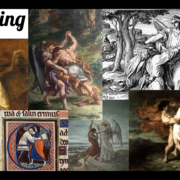Stop and let goodness catch us
At the start of this week’s Torah portion, we read that Jacob was afraid, and his fear was constricting. He was afraid that Esau would come after him, that the mistakes he made in that relationship earlier in life would come back to harm him now. And from that place of fear he sent his family away. Torah says he was alone on the riverbank, and there, an unknown someone wrestled with him all night until dawn.
The Baal Shem Tov (d. 1760) teaches that sometimes we don’t see ourselves clearly. We don’t know what would actually be good for us. All we can see is our own fear, and because we’re marinating in that fear, we run away. Maybe we run away from relationships, or we run away from opportunities. We run away from what would actually be good in our lives, because we’re operating out of that constricted place of fear.
The Baal Shem Tov quotes Psalm 23: “Only goodness and mercy will pursue me all the days of my life.” He says: maybe that line from psalms comes to teach me that I’m trying to escape from things that are actually good for me, but I don’t have the wisdom to see it. So God, when You want to give me good things — when you want to give me blessing — please keep pursuing me. Chase after me until You reach me.
I love this teaching. I love his point that sometimes we don’t have the good sense to know what would be good in our lives, and we run away from what we actually need. And I love the image of God chasing after us with goodness. Usually I think of spiritual life as us seeking God, but he flips that on its head: maybe sometimes God is seeking us, chasing after us, trying to bring us blessing and sweetness and hope.
Maybe we’re running away from a relationship that could be meaningful, but we’re too afraid of having to be real with someone (or with ourselves). Maybe we’re running away from a change that would be good for us, but we’re too afraid of having to face what isn’t working. Maybe we’re running away from hope, because it’s too scary to imagine letting ourselves yearn for something better than what we’ve got now.
In this week’s Torah story, Jacob has been running away from his twin brother for most of his adult life. And he’s about to have to face his brother, whom he tricked out of a birthright and a blessing, and his whole perspective is colored by his fear and his lifetime of running away. This is how his whole life has been, and he can’t imagine it being anything different. He’s always been Yaakov, “The Heel.”
And that’s when he has this encounter with the angel who blesses him with a new name, a new possibility. I’ve always called this the story of “Jacob wrestling with the angel,” but one of my hevruta partners pointed out to me this year that the Hebrew doesn’t say that. In the Hebrew, the subject and object are flipped around. Jacob didn’t seek out this encounter. The angel wrestled with him.
Through the Baal Shem Tov’s lens, we could say: the angel pursued him. The angel was the messenger of God chasing after him to make him grapple with his own baggage all night until morning. And after that grappling, the angel gave him a new name: Yisrael, Godwrestler. That’s the name we take on as the Jewish people, the people that grapples with God, with holiness, with our sacred story… once we stop running away.
Look, running away is normal. It’s human nature to get stuck in our constricted consciousness and our fears. And that’s where the Besht’s teaching comes in, that heartfelt request: “So God, when You want to give me good things, when You want to give me blessing, please keep pursuing me. Chase after me until You reach me.” Don’t give up on me, God. Chase me until You catch me and give me the sweetness I need.
What would it feel like to stop running? To face our own story, to grapple with the lived Torah of our own experience, to look closely at ourselves and our choices? To trust that what’s chasing after us is actually goodness? That if we stop running, here on the banks of this river — if we let ourselves be alone with who we’ve been — God will catch up with us, goodness will catch up with us, and blessing will come?
Shared with gratitude to my hevre in the Bayit Besht Study Sandbox.
This is the d’varling that Rabbi Rachel offered at Shabbat services (cross-posted to Velveteen Rabbi.)





